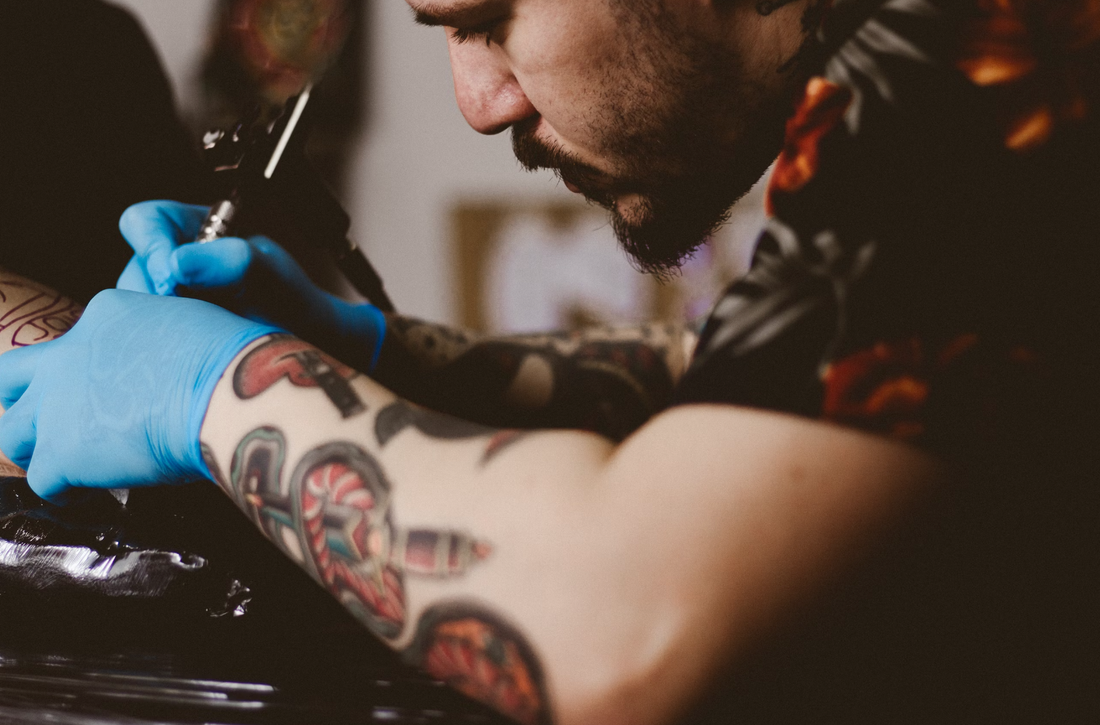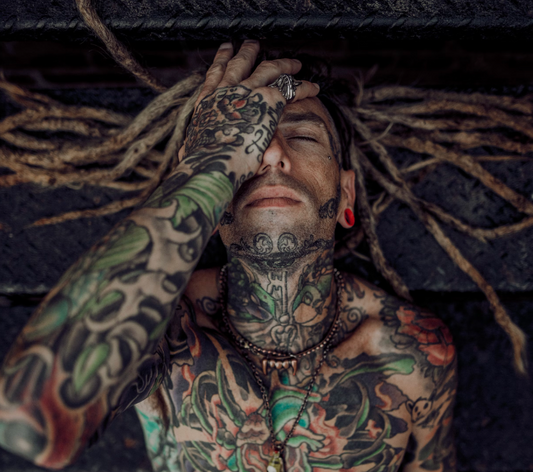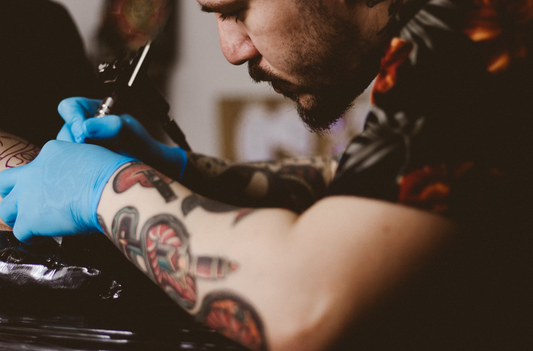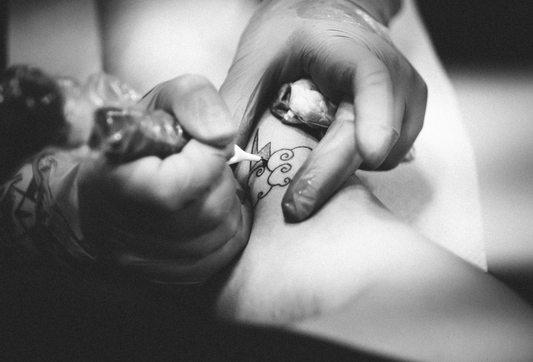Just got inked and wondering if you can hop into the shower without ruining your new masterpiece? It's a common question that crosses everyone's mind after getting a tattoo. After all, you've just invested time, money, and a bit of pain into your new art, and the last thing you want is to mess it up.
Understanding the dos and don'ts of tattoo aftercare is crucial for ensuring your ink heals perfectly and looks great for years to come. Showering the right way won't harm your tattoo, but there are definitely some guidelines you'll want to follow to protect your new ink. Let's dive into what you need to know about showering after getting a tattoo.
Key Takeaways
- Wait at Least 24 Hours: It's essential to wait a minimum of 24 hours before showering to allow your new tattoo to start the healing process undisturbed.
- Use Lukewarm Water and Gentle Soap: Always shower with lukewarm water to avoid irritation and use fragrance-free, antibacterial soap to keep the tattooed area clean without harshness.
- Avoid Direct Water Flow and Soaking: Prevent direct streams of water on the new tattoo and minimize overall exposure to water to protect the ink and aid healing.
- Pat Dry, Don't Rub: After showering, gently pat the tattoo dry with a clean, soft towel instead of rubbing, to avoid damaging the skin and ink.
- Apply aftercare products as recommended: Following a shower, apply a thin layer of specially formulated, fragrance-free aftercare product to promote healing.
- Short and Efficient Showers: Keep showers brief, no longer than 5-10 minutes, to avoid over-saturating the tattoo, which can impede the healing process.
Why is showering after a tattoo important?
When you get a new tattoo, maintaining cleanliness is paramount. Showering not only refreshes your body but also plays a crucial role in the healing process of your new ink. Keeping the tattooed area clean helps to prevent infections that can arise from bacteria entering the skin. Remember, a fresh tattoo is essentially an open wound.
Showering after getting a tattoo assists in gently removing any excess blood, plasma, or ink that may have seeped out. This is important because allowing these substances to dry on the skin can lead to scabs forming. Scabbing is a natural part of the healing process, but excessive or heavy scabs can distort the appearance of your tattoo and potentially pull color from the design as they fall off.
Additionally, Proper Hydration of the skin is crucial for the healing of your tattoo. Showering can help to keep the skin hydrated; however, hot showers can strip the skin of its natural oils, leading to dryness. Stick to lukewarm water and avoid direct streams of water on your fresh ink.
It's also vital to use a fragrance-free, gentle soap to cleanse the area, avoiding harsh chemicals or additives that can irritate the tattoo. Patting the tattoo dry with a clean, soft towel rather than rubbing it will help prevent irritation.
Showering after getting a tattoo not only contributes to the overall cleanliness of the tattooed area but also promotes a healthy healing environment. By following the specific guidelines for showering, you can help ensure that your tattoo heals properly and remains vibrant and clear for years to come.
How long should you wait before showering after getting a tattoo?
When you've just gotten a new tattoo, it's natural to wonder when you can resume your normal shower routine. The waiting period before your first post-tattoo shower is crucial for the healing process. Most tattoo artists recommend waiting at least 24 hours before washing the tattooed area. This timeframe allows the initial healing process to start without interference, minimizing the risk of infection and ensuring the ink begins to settle properly under your skin.
During the first day, your tattoo will secrete excess ink, blood, and plasma. This is a normal part of the healing process. Showering too soon can wash away the essential nutrients that are aiding in the healing of your skin. However, this doesn't mean you should avoid cleaning the area entirely. After the recommended waiting period, you can gently wash the surface of your new tattoo using lukewarm water and a fragrance-free, antibacterial soap. Remember to pat it dry with a soft, clean towel or paper towel. Rubbing can irritate the skin and affect the tattoo's appearance.
- Wait at least 24 hours before showering
- Use lukewarm water and gentle, fragrance-free soap
- Pat the area dry—do not rub
Following these guidelines helps maintain the integrity of your tattoo during those precarious first days. Keeping the tattooed area clean without disturbing the healing process is a balancing act, but with the right approach, you can ensure your new artwork heals beautifully and remains vibrant for years to come.
What should you do before getting into the shower?
Before you step into the shower with your new tattoo, there are critical steps you must follow to protect the integrity of your ink and promote healing. Preparing your tattoo for its first encounter with water is not just recommended; it's crucial for avoiding complications.
Check the Healing Process
First and foremost, ensure that at least 24 hours have passed since you got your tattoo. This waiting period allows your skin to start the healing process, forming a protective layer over the tattoo. It's essential to give your tattoo this time to seal and begin recovery before exposing it to water.
Use the Right Products
Gathering the right cleaning supplies is a step you can't skip. You'll need:
- Fragrance-free, antibacterial soap: This type of soap cleans without irritating your skin or the tattoo.
- Clean, soft towel: A towel that's gentle on the skin is best for patting the area dry without causing abrasion.
Cover It Up, If Advised
Some tattoo artists recommend lightly covering the tattooed area with plastic wrap before your first few showers to prevent direct exposure to water streams. However, this advice varies, and you should always follow the specific instructions given by your tattoo artist.
Be Mindful of the Water Temperature
Hot water can harm your new tattoo, so it's advised to use lukewarm water. It’s gentle on your healing skin and doesn’t cause unnecessary stress to the tattooed area.
By following these preparatory steps, you're setting the stage for a successful healing process. Remember, your tattoo is not just artwork on your body; it's an open wound that requires careful attention to heal beautifully.
Can you get your tattoo wet in the shower?
After patiently waiting for 24 hours to take that much-anticipated shower post-tattoo, it's natural to wonder how much water your new ink can handle. The short answer is yes, you can get your tattoo wet in the shower, but with caution. Immersing your tattoo in water or allowing a strong stream of water to hit it directly could cause significant damage. Hence, it's essential to understand the balance between keeping your new tattoo clean and preventing it from soaking.
When showering, make sure the water flow is gentle and avoid direct contact with your tattoo. Using lukewarm water is vital, as hot water can not only be painful on your sensitive skin but also has the potential to open pores and leech ink from your tattoo, blurring the design. Similarly, cold water can be shockingly uncomfortable and isn't beneficial for the healing process.
- Gentle Water Flow: Ensure the water stream is soft on your skin.
- Lukewarm Water: Provides a comfortable temperature that won't harm your tattoo.
- Minimal Exposure: Keep your tattoo under water for the least time possible.
- Pat Dry: Use a soft towel and gently pat the tattooed area dry; do not rub.
Remember, your primary goal during the shower is to cleanse the tattooed area without saturating it. You might want to focus on quick, efficient showers rather than long, steamy ones. Consider using fragrance-free, antibacterial soap and lightly applying it around the tattooed area without scrubbing. After cleaning, a soft patting action with a clean towel will help protect your tattoo from irritation.
Lastly, always follow any specific aftercare instructions provided by your tattoo artist regarding showering and getting your tattoo wet. They know the intricacies of your particular tattoo and can offer tailored advice to ensure optimal healing.
What temperature should the water be?
When considering showering after getting a tattoo, the temperature of the water isn’t just a minor detail—it's a crucial factor in your tattoo's healing process. Using lukewarm water is strongly recommended for a reason. It strikes the perfect balance, being neither too hot nor too cold, which is essential for the sensitive phase your skin is going through.
Hot water can seem soothing but it’s a deceptive comfort when it comes to tattoo aftercare. Here’s why:
- Hot water can increase the risk of irritation and inflammation, aggravating the tattooed area.
- It may cause your pores to open up more, potentially leading to ink dissipation, which you certainly want to avoid.
- Besides, hot showers can be painful on a fresh tattoo, amplifying the discomfort instead of easing it.
Cold water, on the other hand, isn’t your ally either. Although it could feel refreshing, especially if your skin feels overheated from the tattooing process, cold water doesn't effectively support the healing process. It can tighten and shock your skin, making the area around your tattoo feel unnecessarily tense and uncomfortable.
So, how do you find that lukewarm sweet spot? Aim for water that feels warm to the touch but not hot. It should be comfortable and soothing without causing any pain or discomfort to your tattoo. This temperature helps in cleaning the area effectively while being gentle enough not to disturb the delicate healing process.
Remember, the goal is to clean your tattoo safely while promoting optimal healing. Paying attention to the water temperature can significantly contribute to achieving both. Keep your showers quick, and always pat the tattooed area dry with a clean, soft towel. Avoiding extremes in water temperature protects your skin, ensuring your new tattoo heals beautifully and remains vibrant for years to come.
How should you clean your tattoo in the shower?
Cleaning your tattoo properly while showering is crucial for ensuring its healthy healing and longevity. First, make sure you've waited at least 24 hours after getting your tattoo before you take that first shower. This waiting period allows the initial healing to set in, reducing the risk of washing away any ink or causing an infection.
When it's time to shower, there are a few key steps you'll want to follow:
- Use lukewarm water – As mentioned, extreme temperatures can harm your new tattoo. Lukewarm water is ideal as it's gentle on the skin and won’t cause any unnecessary irritation or discomfort.
- Opt for mild, fragrance-free soap – Harsh chemicals and fragrances found in some soaps can irritate your tattoo. Instead, choose a mild, fragrance-free soap to lightly clean the area. Make sure to avoid scrubbing the tattoo. Gently lather the soap around the tattooed skin with your fingers, not directly on it.
- Be gentle when washing and rinsing – Avoid direct water spray from the showerhead on the fresh tattoo. It’s better to let the water run off your body and over the tattooed area naturally. This prevents the force of water from damaging the delicate skin.
After you've carefully cleaned your tattoo, it’s essential to pat it dry with a soft, clean towel. Rubbing can cause irritation, so gently patting ensures you don't do any harm while drying.
Remember, quick and efficient showers during the initial healing phase are best. Spending too long in the shower can saturate your tattoo, potentially affecting the healing process and the appearance of your ink. Following these guidelines will help keep your tattoo clean and contribute to its successful healing, ensuring your tattoo looks vibrant for years to come.
What kind of soap should you use?
When it comes to washing your new tattoo, choosing the right soap is crucial for both the healing process and preserving the vibrancy of your ink. Fragrance-free, antibacterial soaps are the gold standard as they clean without being overly harsh or irritating the sensitive skin around your new tattoo.
It's important to note that harsh chemicals, dyes, and fragrances found in many conventional soaps can lead to unnecessary irritation or even allergic reactions. These reactions can interfere with the healing process, potentially affecting the appearance of your tattoo. Therefore, opting for a mild, gentle soap is your best bet to ensure your tattoo heals properly while keeping the risk of irritation to a minimum.
Here are a few key points to remember:
- Choose fragrance-free: Fragrances can irritate the tattooed area. Look for soaps labeled as "fragrance-free" or "for sensitive skin."
- Antibacterial matters: While you don't need the soap to be overly medicinal, an antibacterial property can help keep the area clean and free from harmful bacteria.
- Avoid harsh chemicals: Soaps containing alcohol, parabens, or excessive dyes should be avoided as they can be drying and irritating.
Many tattoo artists and skin care professionals recommend specific brands that are gentle yet effective for tattoo aftercare. Brands like Dove, Cetaphil, and Neutrogena offer products that fit these criteria well. However, it's always a good idea to use a small amount of the new soap on a part of your body other than the tattoo to ensure you don't have an adverse reaction.
By choosing the right soap and following proper aftercare instructions, you're taking significant steps toward ensuring your tattoo heals beautifully. Remember, the aftercare process plays a pivotal role in how your tattoo will look for years to come, so investing in a good-quality soap is worth the effort.
Should you scrub or avoid scrubbing the tattoo in the shower?
When it comes to maintaining your new tattoo, the approach you take in the shower can significantly impact the healing process. It's essential to understand that scrubbing your tattoo is not recommended at any stage of aftercare. The skin around your new ink is sensitive and requires gentle handling to prevent irritation and ensure optimal healing.
Instead of scrubbing, you should lightly wash the tattooed area. Use a mild, fragrance-free soap and your hands to carefully apply the soap around the tattoo, not directly on it. This method helps to remove any excess plasma, ink, or ointment without being harsh on the skin’s surface. Rinse the area by letting lukewarm water flow gently over the tattoo. Avoiding direct water spray is crucial, as a powerful stream can cause unnecessary stress on the healing skin.
After showering, pat the area dry with a clean, soft towel. Be sure not to rub the towel over the tattoo, as this can lead to irritation or even the removal of small pieces of scabbing skin, which are necessary for the healing process.
Quick and efficient showers are key during the healing phase of your tattoo. Spending minimal time under water reduces the risk of your tattoo becoming overly saturated, which can slow down the healing process. Remember, the tattooed skin is healing from an open wound, and treating it with the utmost care is essential for ensuring it heals correctly and beautifully.
Following these guidelines helps to maintain the vibrancy and integrity of your tattoo while preventing complications such as infections, fading, or blurring. Keeping the tattoo clean and dry and applying aftercare products as recommended by your tattoo artist will support a smooth and effective healing period.
How long should you spend in the shower?
After getting a new tattoo, knowing how long you should spend in the shower can significantly impact the healing process. The key is to keep it brief. Ideally, your showers should last no longer than 5-10 minutes. This timeframe is ample to cleanse the body without overexposing your new tattoo to water. Over-soaking can potentially harm the tattoo's appearance, leading to fading or ink loss.
To effectively manage your shower time:
- Prep your shower to ensure you have everything you need within reach. This preparation minimizes the time spent in the shower.
- Focus on being quick and efficient. Aim to clean your body and the area around the tattoo without directly soaking the new ink.
- Use lukewarm water and avoid letting the water stream directly onto the tattoo. Instead, lightly splash water over it.
- Apply a small amount of mild, fragrance-free soap to cleanse the area gently. Remember, the goal is to avoid soaking the tattoo while ensuring hygiene.
By sticking to a concise shower regimen, you’re fostering an environment conducive to healing. It's not just about minimizing time; it's about adopting a shower routine that sustains the tattoo's vibrancy and detail during those critical first weeks.
Remember, your tattoo is like an investment. By dedicating the effort to protect it from prolonged water exposure, you're ensuring that this personal artwork remains as brilliant as when you first got it. Quick, lukewarm showers become a part of your aftercare routine, a small but essential commitment to the longevity of your tattoo.
What should you do after showering?
After you've effectively managed your shower with care, maintaining the integrity of your new tattoo, the next essential steps are just as crucial for ensuring your tattoo heals impeccably. Immediate aftercare following your shower can greatly influence the healing process and the final appearance of your tattoo.
First and foremost, gently pat the tattooed area dry with a clean, soft towel. It's imperative to avoid rubbing or using abrasive materials that could irritate the skin or potentially disrupt the healing process. Your tattoo should be merely damp to the touch, not wet, as excess moisture can lead to issues such as bacterial growth or ink disruption.
Once dried, applying a thin layer of a recommended aftercare product becomes your next step. Products specifically designed for tattoo aftercare are quintessential in fostering a conducive healing environment. Opt for fragrance-free and alcohol-free options to minimize potential irritation. These specialized moisturizers help keep the tattooed skin hydrated without suffocating it. It's vital to apply only a small amount; over-moisturizing can trap too much moisture, leading to adverse effects.
Lastly, it’s crucial to allow your tattoo to breathe. While it might be tempting to cover it up to protect it from external contaminants immediately after showering, ensuring adequate airflow is key to the healing process. Tight clothing or bandages should be avoided unless specifically advised by your tattoo artist for certain conditions or periods.
Remember, the healing process for each individual and tattoo varies. Always adhere to the specific aftercare instructions provided by your tattoo artist, as they understand the intricacies of your particular situation. Stick to your aftercare routine diligently, and you'll be on the path to a beautifully healed tattoo.
Conclusion
Showering after getting a new tattoo doesn't have to be a daunting task if you're equipped with the right knowledge. Remember to wait at least 24 hours before your first shower to protect your ink and then proceed with caution. Use lukewarm water and avoid direct streams on your new masterpiece. Opting for fragrance-free, antibacterial soap and gentle patting dry are key steps in your aftercare routine. It's all about maintaining the balance between keeping the tattoo clean and not over-saturating it. By choosing the right products and following the advice of your tattoo artist, you're setting yourself up for a smooth healing process. Your tattoo is not just art; it's a part of your body now. Treat it with care and it'll look vibrant and beautiful for years to come.
Frequently Asked Questions
When can I shower after getting a tattoo?
You should wait at least 24 hours before showering after getting a tattoo to allow the initial healing process to start without interference.
Can I use hot water to shower with a new tattoo?
It is recommended to use lukewarm water for showering with a new tattoo, as hot water can be painful and cold water does not benefit the healing process.
How should I wash my new tattoo?
Wash the tattoo by lightly applying a mild, fragrance-free antibacterial soap with your hands around the tattooed area, avoiding direct application on the tattoo. Do not scrub.
What type of soap should I use for my new tattoo?
Choose a mild, gentle, fragrance-free soap that's labeled for sensitive skin, such as Dove, Cetaphil, or Neutrogena. Avoid soaps with alcohol, parabens, or excessive dyes.
How do I dry my tattoo after showering?
Gently pat the tattooed area dry with a clean, soft towel. Avoid rubbing to prevent irritation or removal of scabbing skin.
Is it okay to directly apply soap to the tattoo?
No, avoid applying soap directly on the tattoo. Lightly wash around the tattooed area with your hands using a mild, fragrance-free soap.
How long should my showers be after getting a tattoo?
Quick and efficient showers are recommended to minimize the saturation of the tattooed area and reduce the risk of damage.
Can I immerse my new tattoo in water while showering?
Avoid immersing the tattoo in water or letting a strong stream of water hit it directly, as this could cause damage to the healing tattoo.
What should I do after showering with a new tattoo?
After showering, pat the tattoo dry, apply a thin layer of a recommended aftercare product to keep the skin hydrated, and allow the tattoo to breathe.
Why is choosing the right soap important for tattoo aftercare?
Choosing the right soap helps avoid unnecessary irritation or allergic reactions, ensuring the tattoo heals beautifully and maintains its vibrancy by cleaning without being harsh on sensitive skin.






